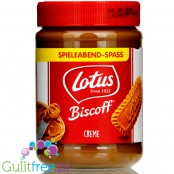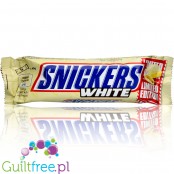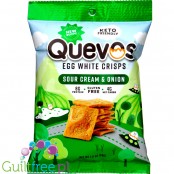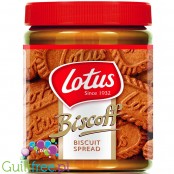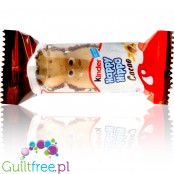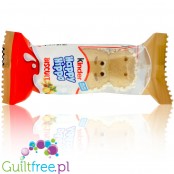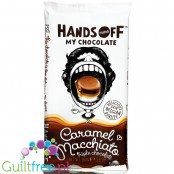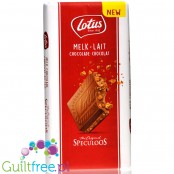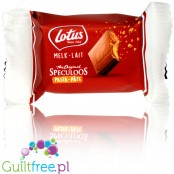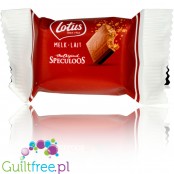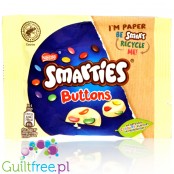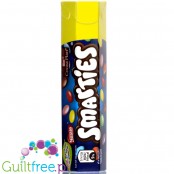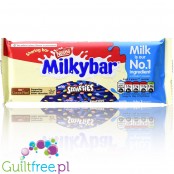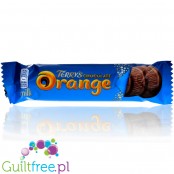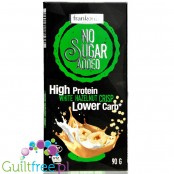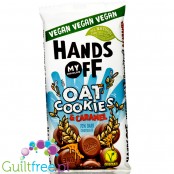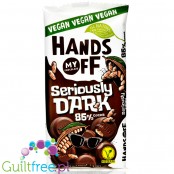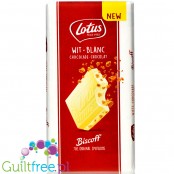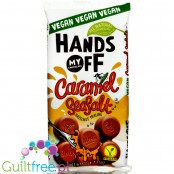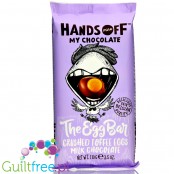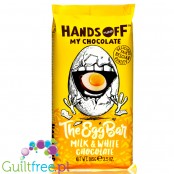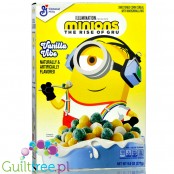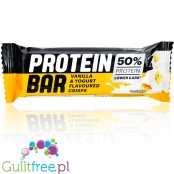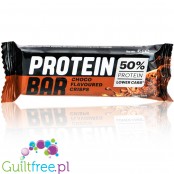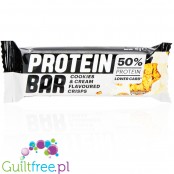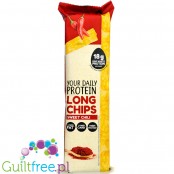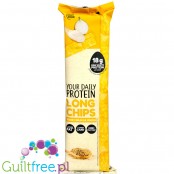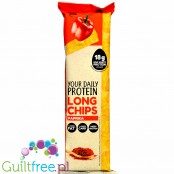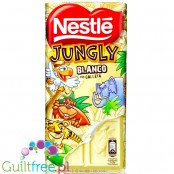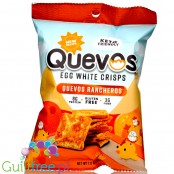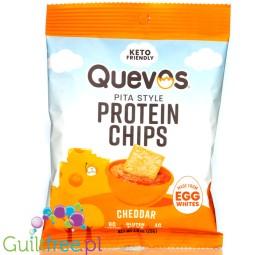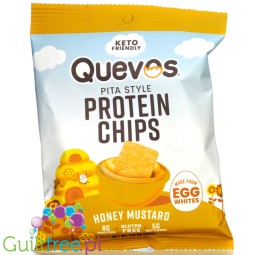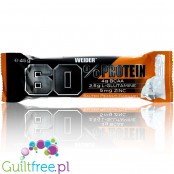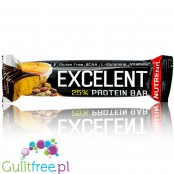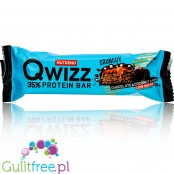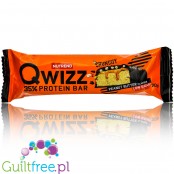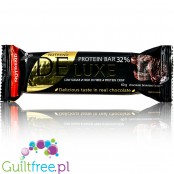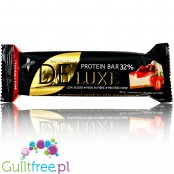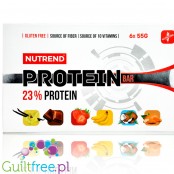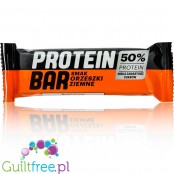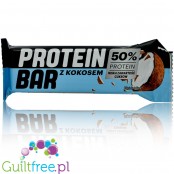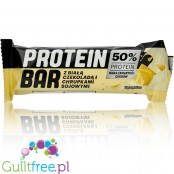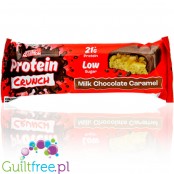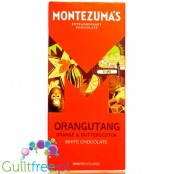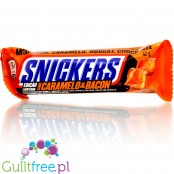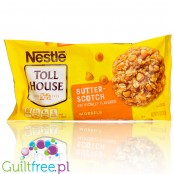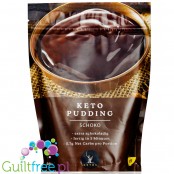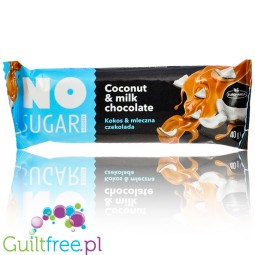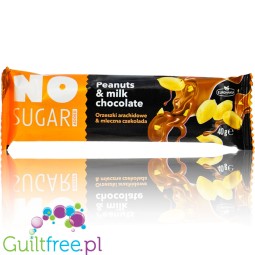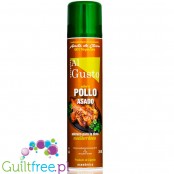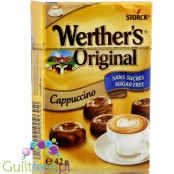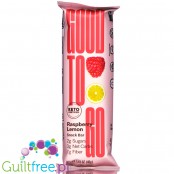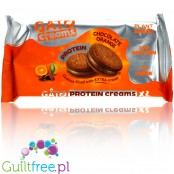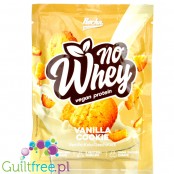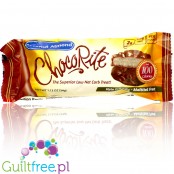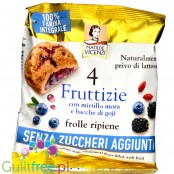Hotline: 885 925 336
E-mail: sklep@guiltfree.pl
Fast shipping up to 48 hours
As many as 12 949 light products
Tony's Chocolonely Fairtrade Milk Chocolate Caramel Sea Salt 47g
Product from the Cheat Meal category - when you feel that debauchery belongs to you, you deserve a reward for weeks of keeping a clean diet and a meal in which you forget about counting macros, because only the taste matters!
Unique in every respect, Tony's Chocolonely Milk Chocolate Caramel Sea Salt is an ultra-delicious, beautiful, precisely made bar of creamy Belgian milk chocolate that melts in your mouth, filled with pieces of crunchy caramel.
Things aren't being shared evenly in the chocolate supply chain. The chain starts with millions of farmers who produce cocoa and ends with the billions of consumers who enjoy chocolate. But what about the bit in the middle? This section is dominated by a handful of chocolate giants that profit from keeping the price of cocoa as low as possible. As a result, farmers are forced to live in poverty. And that leads to illegal child labour and modern slavery.
Almost everywhere in the world, chocolate lovers are provided for with a wide range of flavours to enjoy. Big chocolate companies make -next to a lot of chocolate of course- a lot of profit. Nothing wrong with that, without profits a company will go bankrupt. So far, so good. However, less good is how those profits are made - by exploitation at the start of the value chain, where people live in extreme poverty. Have you ever considered how much a cocoa farmer makes per day?
- 2,5 million farms in Ghana and Ivory Coast produce more than 60% of all cocoa worldwide.
- The average cocoa farmer in the Ivory Coast earns 78 euro cents a day. There’s no way you can live off that or support a family for that meager amount, not even in West Africa.
- In Ghana and the Ivory Coast, 2.1 million children work under illegal conditions because the harvest doesn’t give their parents enough income. We don’t think that’s normal.
Worse still, recent studies have confirmed that at least 30,000 people are the victims of modern slavery – adults and children who are being forced to grow cocoa and don’t get paid a penny for it. In fact, it’s highly likely there are far more victims than that because areas where cocoa is produced illegally have not been included in the studies.
The world market price of cocoa fell by 40% in mid-2017 thanks to a good harvest and market speculation. In the Ivory Coast, the price guaranteed to a farmer for his cocoa fell by almost 40%. So, the decrease of the farm gate price (still) has a tremendous impact on the lives of farming families in the Ivory Coast. The price drop offered major advantages further along the chain. Big Choco saved around $ 4.7 billion in buying costs. So.. where did all that money go? Now that’s a good question. We certainly didn’t notice any price reductions (except our own price reduction in stores..). So, yes, that does give chocolate a bitter aftertaste in our humble opinion.
Right now there is slavery on cocoa farms in West Africa. This is a result of the unequally divided cocoa chain. Tony’s Chocolonely exists to change that. Child labour and modern slavery are against the law - it's illegal and it needs to stop.
Tony’s 5 rules of the game for slave-free cocoa
Over the last few years we've been working on Tony’s Chocolonely's rules of the game for slave-free cocoa. At this point we are confident that it enables cocoa farmers to earn a living income. And that will put an end to modern slavery and illegal child labor on cocoa farms in West Africa.
Rule #1 traceable beans
Tony’s cocoa beans (used for both cocoa mass and cocoa butter) are fully traceable, and that makes us pretty unique. We purchase them directly from our partner cooperatives Kapatchiva, Ecojad, Socoopacdi and ECAM in Ivory Coast and ABOCFA in Ghana. That means that we're able to guarantee that the beans in our bars come from one of our partner cooperatives. The members of our partner cooperatives have steadily increased their cocoa production since we first started all of this. An adequate planning and accurate estimations of the amount of required beans, are very important in order to achieve this increase. And Tony’s Beantracker ensures we know exactly when our beans are being transported and from which cooperative they are coming from.Rule #2 a higher price
How it works: an additional premium:
Until there is a sustainable solution for the ongoing low cocoa prices, we bridge the gap between the floor price the farmer gets and the living income he or she should earn with Tony's premium. Tony's premium consists of two partsL the Fairtrade premium and the additional Tony's premium. The premium is determined at the start of the chocolate season, based on the minimum farmgate price determined by the governments of Ghana and Ivory Coast. At that time we check if our data on farming costs and livelihood are still correct. This way, we can adjust the premium in a way that the farmers we work with are being paid a decent income, enabling them to provide for their family.
Tony’s premium over the 2017/2018 season was $ 400 per tonne cocoa in Ivory Coast and $ 175 per tonne cocoa in Ghana. These figures are on top of the Fairtrade premium of $ 200 per tonne cocoa also paid by Tony's. In the past season, we worked with 5.021 farmers who got paid these extra premiums.
Rule #3 strong farmers
We invest in the cooperatives we work with and help to make them stronger. We show them how to operate more professionally as an organization, help them achieve economies of scale and create commitment and trust amongst the farmers. Strong cooperatives offer many benefits for farmers. For instance, they can negotiate a better price when buying production resources collectively. Farmers who are not members of a cooperative often experience way more difficulties. We are proud of the commitment shown by the farmers we work with. There's always a huge turnout at the annual general meetings in both Ghana and Ivory Coast. Talk about a full house! We ensure that delegates from Tony’s are there too, so we can get to know the farmers even better and see that our premium is being put to good use.
Rule #4 the long term
We work with farmers for at least 5 years. That way they know they'll receive the Tony’s premium for their harvest for the next few years. That gives them the opportunity to make long-term investments in their farms. For example, they can buy new cocoa plants for a better harvest for example, or invest in farming equipment or training. As a result of our long-term relationship, we see that the farmers are now more aware of the consequences of child labor. There are projects that address issues such as child labor and farmers’ rights, like the Child Labor Monitoring and Remediation System (CLMRS) which surveys the cooperatives and helps improve living conditions for farmers. Before we can start talking about eliminating illegal child labor or modern slavery, it's necessary to create supportive conditions in the community.
And by the way, in our collaboration agreement there's a transparancy clause. We think it's absolutely fine that cooperatives share our agreement with other potential buyers. This way they can That way they can negotiate the same commitment and agreements. And..drumroll! This year we saw results. The cooperative ABOCFA has won Taza Chocolate and Uncommon Cacao with longterm commitments for their biological cocoa. We're superhappy with that!
Rule #5 improved productivity and less dependency on cocoa
Not only does the price of cocoa need to be higher, but so does the production. Everyone has to take responsibility for our recipe to work. A good farmer supported by a professional cooperative that achieves economies of scale, should be able to produce 800 kilos of cocoa per hectare. Yet many farmers only produce 30% to 40% of what we think should be possible. This means they miss out on income. Also, the quality of the beans is often poor – many beans don't even get exported. The Tony’s premium encourages farmers to improve their crop. As their farms become more profitable their motivation increases. A win-win! It also enables them to invest in production resources, like better fertilizer, in pruning their trees at the right time and planting new cocoa trees. This increases the quality of their beans and can double their productivity. Of course, we’re realistic enough to realize that while this can happen relatively quickly, it doesn’t happen overnight. That’s why we work with farmers for at least 5 years.
In short, motivated farmers with basic training and a willingness to cooperate and invest more time in their farms can easily harvest 800 kilos per hectare versus the 350 to 550 kilos they currently harvest.
Nutrition Facts
Your review appreciation cannot be sent
Report comment
Report sent
Your report cannot be sent
Write your review
Review sent
Your review cannot be sent
Tony's Chocolonely Milk Chocolate Caramel Sea Salt 32% cocoa - Belgian milk chocolate 32% cocoa with caramel and sea salt
Net weight: 47g
Ingredients: sugar, dried powdered milk, cocoa butter, cocoa mass, pieces of crushed caramel (10%) {sugar, glucose syrup, cream (from milk), butter (from milk), sea salt (0.5%)}, soy lecithin emulsifier.
Allergens: milk and dairy ingredients, soy; may contain eggs, gluten and nuts, including peanuts
Cocoa solids: minimum 32% in chocolate. Minimum milk 21% in chocolate.
Sugar, cocoa liquor, cocoa butter: raw materials purchased according to Fairtrade standards, a total of 69%
Nutritional values per 100g: energy value 537.0kcal / 2250.0kJ, fat 32.0g (including saturated fat 19.0g), carbohydrates 54.0g (including sugars 51.0g), protein 6.9g, salt 0, 6g
Nutritional values in 1/2 chocolate: energy value 126.1kcal / 528.7kJ, 7.5g fat (including saturated fat 4.4g), 12.6g carbohydrates (including 11.9g sugars), 1.6g protein, salt 0.1 g
Producer: Produced in Belgium by Verlinvest S.A., Place Eugène Flagey 18, 1050 Ixelles, Belgium
Importer: Guiltfre.pl K Warda-Poniecka, Wola Gołkowska
Store in a dry, dark place, cool but not in the refrigerator.
Best before: date and batch number on the package.
Featured Products
Reese's Big Cup Stuffed with Pretzels 1.3oz
Scrabble Belgian Milk Chocolates
Reese's White Peanut Butter Cups (cheat meal)
Twix Spekulatius (CHEAT MEAL)
Twix White in white chocolate coating, EU version (CHEAT MEAL)
Snickers White (CHEAT MEAL)
Quevos Keto Friendly Egg White Chips, Sour Cream & Onion 1.1 oz
Lotus Speculoos Smooth spread 1,6kg giga jar CHEAT MEAL
Kinder Happy Hippo Cacao CHEAT MEAL
Kinder Happy Hippo Biscuit Hazelnut CHEAT MEAL
Nestle Smarties Buttons (CHEAT MEAL) Share Size
Lotus Biscoff Spread Filled Milk Chocolate (CHEAT MEAL) 180g
Hands Off My Chocolate Birthday Cake (CHEAT MEAL)
Hands Off My Chocolate Caramel Macchiato Triple Chocolate (CHEAT MEAL)
Lotus Biscoff, Crunchy Pieces Milk Chocolate (CHEAT MEAL) 180g
Lotus Biscoff Spread Filled Milk Chocolate Bag 15g (CHEAT MEAL)
Lotus Biscoff Topping Sauce 1kg Squeezy Bottle (CHEAT MEAL)
Lotus Biscoff Crunchy Pieces Milk Chocolate Bag 15g (CHEAT MEAL)
Nestle Smarties Buttons (cheat meal)
Reese's Puffs (CHEAT MEAL) breakfast cereal, USA imported
Hershey's Gold Peanuts & Pretzels Caramelized Creme
QNT Protein Joy 36% Cookie & Cream
Nestlé Smarties Hexatube (CHEAT MEAL)
Nestle Smarties Milkybar White Chocolate (CHEAT MEAL)
Hershey's Sprinkles n Creme (CHEAT MEAL)
Hershey's Strawberries n Creme (CHEAT MEAL)
Terry's White Chocolate Orange (CHEAT MEAL)
Terry's Chocolate Orange (CHEAT MEAL)
Frankonia Chocolat No Sugar Added High Protein White Hazelnut Crisp, 90 G
QNT 50% Protein Bar Chocolate Cookie
Hershey's Cookies 'n' Creme (CHEAT MEAL)
Esn Protein Pudding, 360g, Chocolate
Hands Off My Chocolate Oat Cookies & Caramel Vegan
Hands Off My Chocolate Seriously Dark 85% Vegan
Hershey's Milk Chocolate & Reese's Pieces (CHEAT MEAL)
Lotus Biscoff, Crunchy Pieces White Chocolate (CHEAT MEAL) 180g
Hands Off My Chocolate, Vegan Salted Caramel & Hazelnut Praline (CHEAT MEAL)
Duplo Cocos CHEAT MEAL milk chocolate wafer with coconut cream
Hands Off My Chocolate The Egg Bar Crushed Toffee Eggs Chocolate (CHEAT MEAL)
ands Off My Chocolate The Egg Bar Milk & White Chocolate (CHEAT MEAL)
Hands Off My Chocolate The Egg Bar Carrot Cake 70% Dark Chocolate (CHEAT MEAL)
Duplo Spekulatius CHEAT MEAL milk chocolate wafer with speculoos cream
Lion Caramel Blond CHEAT MEAL
Duplo Chocnut Dark (CHEAT MEAL)
Hershey's Kisses Birthday Cake (CHEAT MEAL)
Hershey's Kisses Strawberry Ice Cream Cone (CHEAT MEAL)
General Mills Minions Vanilla Vibe Cereal (CHEAT MEAL)
Terry's White Chocolate Orange (CHEAT MEAL)
Duplo White CHEAT MEAL white chocolate covered crispy wafer with hazelnut cream
Lotus Biscoff Spread Filled Dark Chocolate (CHEAT MEAL) 180g
Protein Bar Vanilla & Yogurt Crisps 50% - protein bar 50% protein, 170kcal
Protein Bar Choco Crisps 50% - protein bar 50% protein, 170kcal
Protein Bar Cookies & Cream Crisps 50% - protein bar 50% protein, 170kcal
Weider - 60% Protein Bar, Cookies & Cream, 27g protein & 167kcal
Long Protein Chips - EGGY FOOD Sweet Chilli
Long Protein Chips - EGGY FOOD Sour Cream & Onion
Long Protein Chips - EGGY FOOD Paprika
Nestle Jungly Blanco Galleta (CHEAT MEAL)
Quevos Keto Friendly Egg White Crisps, Quevos Rancheros 1 oz
Quevos Keto Friendly Egg White Crisps, Cheddar 1 oz
Quevos Keto Friendly Egg White Crisps, Honey Mustard 1 oz
Quevos Keto Friendly Egg White Crisps, Mesquite BBQ 1 oz
Haribo 100th Anniversary Clip Strip - Pineapple Gold Bears 4oz (113g)
Lotus Speculoos Smooth spread 200g
Weider - 60% Protein Bar, Salted Peanut-Caramel, 27g protein & 167kcal
Weider - 60% Protein Bar, Vanilla Caramel, 27g protein & 167kcal
Nutrend Excelent Protein Bar Peanut Butter 85g
Nutrend Excelent Protein Bar Salted Caramel 85g
Nutrend Excelent Protein Bar Almond Pistachio 40g
Nutrend Excelent Protein Bar Blackcurrant Cranberries 40g
Nutrend QWIZZ Protein Bar Chocolate Coconut , 21g protein & 218kcal
Nutrend QWIZZ Protein Bar Peanut Butter 21g protein & 221kcal
Nutrend Deluxe Protein Bar Chocolate Cookie 60g
Nutrend Deluxe Protein Bar Strawberry Cheesecake 60g
Nutrend Deluxe Protein Bar Gift Set 6 x 60g
Nutrend Protein Bar Collection Gift Set 6 x 55g
Protein Bar Peanut Butter 50% - protein bar 50% protein, 170kcal
Protein Bar Coconut 50% - protein bar 50% protein, 170kcal
Protein Bar White Chocolate Crisps 50% - protein bar 50% protein, 170kcal
Applied Nutrition Crunch Bar Milk Chocolate Caramel
Montezuma's Orangutang Orange & Butterscotch (CHEAT MEAL)
Snickers Caramelo & Bacon (CHEAT MEAL) - Brasilian limited edition
Hershey's Salted Caramel Toffee & Caramel Salé (CHEAT MEAL)
Hershey's Cotton Candy (CHEAT MEAL)
Toll House Butterscotch Morsels 11oz (311g) (CHEAT MEAL)
Ketos Keto Pudding, 260g, Chocolate
Duplo Dark & Vanilla CHEAT MEAL dark chocolate wafer with vanilla cream
Terry's White Chocolate Orange 85g (CHEAT MEAL)
Weider 60% Protein Bar Strawberry & Yoghurt 45g
Eurohansa No Sugar Coconut & Milk Chocolate 40g
Eurohansa No Sugar Peanut & Milk Chocolate 40g
Other customers also chose
Aerosoles Al Gusto Grilled Chicken - smakowa oliwa extra virgin w spray'u, smak Grillowany Kurczak
Skinny Food Co Barista Zero Calorie Coffee Syrup 1L English Toffee
Nature's Hollow Sugar Free Syrup, Maple 10 oz.
Milka Unser Serien-Abend (CHEAT MEAL) winter 2021 limited edition
Werther's Original Cappuccino candy sugar-free, sugar free, contains sweetener
Good to Go Snacks, Keto Snack Bar, Raspberry Lemon
Applied Nutrition Protein Indulgence Birthday Cake Crisp
GATO Protein 'n' Cream Chocolate Orange 50g
Rocka Nutrition NO WHEY Vegan Protein Vanilla Cookie 30g
Healthsmart ChocoRite Coconut Almond sugar free low carb bars
Funky Flavors Sweet Cereal Milk - sweetened, liquid, sugar & fat free food flavoring
Bear Paws 100% owoców Maliny & Jagody
Vicenzi Fruttizie Forest Fruit & Goji -sugar free wholemeal shortbread cookies with fruits 40g
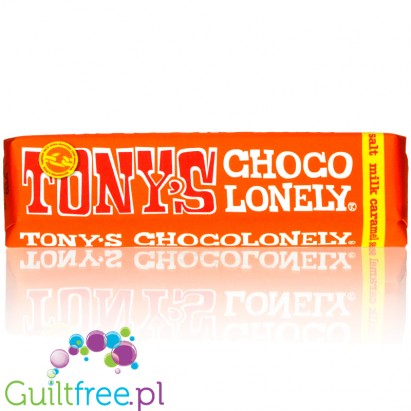
Unique in every respect, Tony's Chocolonely Milk Chocolate Caramel Sea Salt is an ultra-delicious, beautiful, precisely made bar of creamy Belgian milk chocolate that melts in your mouth, filled with pieces of crunchy caramel.







